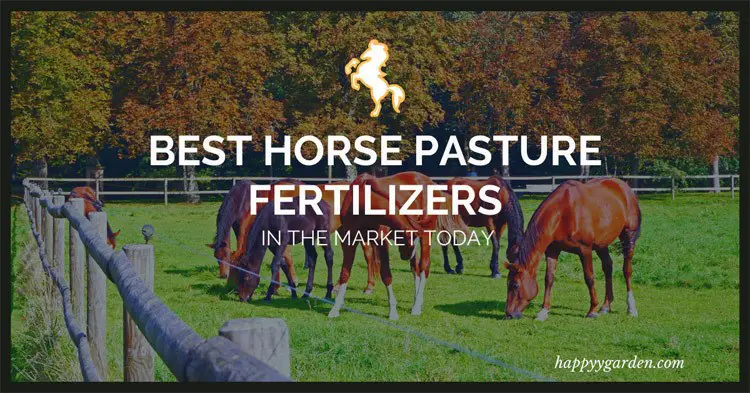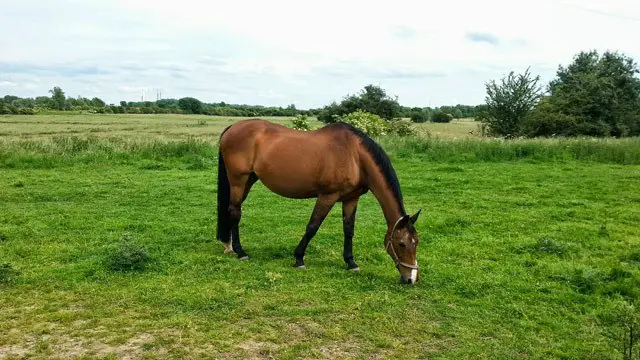Top 5 Best Horse Pasture Fertilizers In The Market Today

Best horse pasture fertilizers
If you want to take good care of a horse pasture field, one of the things that you must ensure is to get the best horse pasture fertilizer. Of course, many other things play a crucial role as well in establishing good pasture management practices but getting the best fertilizer for horse pasture should be your number one priority to ensure a greater yield for your stable.
But, how does one know what is the best fertilizer for horse pasture? No doubt, this is a challenging subject to tackle. Therefore, in this guide, we take a look at some of the things that you must keep in mind when getting the best horse pasture fertilizer. And, even after you go through our guide and you’re not sure which products to go for, then you can check out the top five products mentioned in the second half of this article.
Table of Contents
The need for a grass fertilizer for horse pasture
Soil fertility is the driving factor for forage production in horse pastures. Though it is important to supply the grass with proper nutrients, it is equally important to ensure that one does not apply excessive nutrients as it can lead to environmental pollution and the degradation of the soil.
Without certain nutrients, plant productivity can reduce significantly. Some of them include, but are not limited to, Potassium, Nitrogen, and Phosphorous. Most recommendations for Potassium and Phosphorous are based on soil tests and nutrient analysis, which is specific to each pasture. Most soil tests do not measure Nitrogen because of its high mobility in the soil.
Most fertilizers have their nutrient listing given on the package itself as it is required by the law. It is usually given in a code of three numbers. For instance, one product can have it labeled as 10-20-5, which is read as 10% Nitrogen, 20% Phosphorous, and 5% Potassium.
Types of horse pasture fertilizer for sale

The different types of fertilizer for horse pasture cater to different needs
The different types of fertilizers available in the market cater to different needs which depend upon weather, soil pH levels, and a preference for synthetic or organic formula. Let’s check out a few of them:
- Time-release fertilizers – These fertilizers help feed the lawn for a period of time and require a one-time application. The fertilizers continually supply the soil with the necessary nutrients thereby keeping the grass healthy for long periods of time.
- Gradual release fertilizers – These fertilizers have a slow-release formula and provide the necessary nutrients to plants when needed while preventing them from draining into the soil.
- Granular Fertilizers – These fertilizers are easy to spread as they are dry and have a small granular shape.
- Liquid fertilizers – As the name suggests, these fertilizers are water-soluble. Though it requires one to use a hose to spray them with water, one can do so without with little care. These are easily absorbed by the soil and ensure that the fertilizers reach the bottom of the soil and cover the roots.
- Organic fertilizers – Some of the best horse pasture fertilizer are made from natural ingredients. Though they take some time to take effect, their application is harmless to the grass and the soil.
- Synthetic fertilizers – These are made from chemicals and allow for lush growth and improve the quality of the soil by helping with pest control.
Top 5 horse pasture fertilizer recommendations
Now that we have covered a few basic aspects of what to look out for in the best horse pasture fertilizer and how to go about using it on your pasture, let us take a look at some of the top contenders in the market.
Image | Product | Rating | Price |
|---|---|---|---|
If you’re looking for the best horse pasture fertilizer, you can never go wrong with Scotts. This fertilizer can be used for any type of grass. As the name suggests, it is advisable to apply it during any season as it helps grown deep roots and repair the damage done by summer heat, droughts, and footfalls.
The fertilizer has a slow granular application, which feeds the lawn during the winter months since the roots continue to grow during dormancy. As the roots repair during these months, the grass comes back thicker and stronger during springtime. The feed improves the lawn’s overall ability to absorb water and nutrients. It is also a safe fertilizer for horse pasture and there is no need to keep your horses away from the pasture after application. It is advisable to apply this lawn food judiciously as a heavy application can burn new seedlings.
Pros
Cons
This product is widely regarded as the go-to product if the soil is deficient in nitrogen. It is a great nitrogen supplement for your pastures and ensures that your pastures return to producing green leafy vegetations.
The high nitrogen content promotes horse pasture bloom while the low phosphorous levels ensure that the side effects of the fertilizer on your horse are minimized. The application of this fertilizer should be done during late spring to boost growth in subsequent months.
The fertilizer is water soluble and can be applied with the irrigation water and other chemicals to improve pasture quality. The main ingredient, Nitrogen, ensures that the pastures become lush and green while improving drought-resistant capabilities.
Pros
Cons
X-seed has been the manufacturer of pasture land seeds for a long time and its products are a testament to their craft. This forage mixture offers high-quality grass hay that provides all the nutrients that your horses will ever need.
The seed mix improves soil fertility and provides erosion control. The forage seeds germinate quickly as they are equipped with micro boost germination which creates a nutrient friendly zone. The seeds develop long fibrous roots and create larger seedlings that have the ability to withstand long periods of environmental stress. They end up producing endophyte-free forage that is palatable and doesn’t cause bloat.
By simply applying the mix to a pasture that needs a boost, you ensure that your old fields are rejuvenated. The mix comprises of ryegrass, orchard grass, and clover, and a single back is sufficient for an acre of land.
Pros
Cons
Another amazing product comes from Walt’s Organic Fertilizer Co. The chief ingredient in this product is sulfur which works as a soil conditioner. If the soil is well-conditioned, the other nutrients will be well received by the soil and the plant. Apply this fertilizer to the pastures and you will ensure high growth rates and nutritious and palatable food in your horse pastures.
The high sulfur content also ensures that the pastures are kept from yellowing. The sulfur pellets also reduce soil pH level thereby allowing you to harvest more from the land. Its application is super easy as you are only required to spread the pellets with a spreader.
Pros
Cons
Last but not least, we have a premium product by PastureRX. This grass seed mix has many features that make it one of the best in the market for horse pastures, especially when it comes to rejuvenating them.
Firstly, the seeds germinate rapidly within 7 to 10 days of application. They germinate swiftly and have sustainable growth, which works well for repair jobs as well. The nutritional content is excellent and has the ideal balance of legumes and grasses. This makes the hay highly palatable and digestible for your horses. They are also very easy to plant and are ready to be grazed upon once the plants have taken root.
The seed coating improves seedling establishment which improves that pasture’s overall yield and longevity. Ultimately, using this mix ensures that you don’t have to focus much on planting and have time enough to tend to your pastures and your horses.
The seedlings are also highly water-absorbent and can hold 600 times their weight in water making them resistant to drought. The mix consists of seeds of orchardgrass, red clover, novel fescue, ryegrass, and alfalfa. Pasture owners are advised to plant these seeds in the winter, early spring, late summer, or early fall.
Pros
Cons
When to use the horse pasture fertilizer
Knowing how to make a good horse pasture has more to do with timing than anything else. The growth pattern of the forage should be taken into account and your application of the best horse pasture fertilizer should match it.
Legumes and grasses such as bromegrass, bluegrass, and orchardgrass are suited for the cooler season and their growth is greatest during spring and fall. For such cases, a split approach is recommended. Applying the fertilizer during early spring will boost summer growth, while application during early summer will boost fall growth. This approach works by splitting the total amount required into two applications – applying one half in early spring, and another half in early summer.

Horse pasture on private farmland
How to spread the fertilizer
One can use a broadcast spreader to spread granular fertilizers. On small pastures, spreaders pulled by tractors or walk-behind spreaders work just fine. It is best to fertilize before some light rain as it helps dissolve the fertilizer and move it to the roots of the grass. Avoid spreading fertilizers in areas of standing water, ponds, lakes, or streams.
Will fertilizer hurt horses?
Though most organic fertilizers are quite safe and won’t hurt your horses, the same cannot be said about the other different types of fertilizers especially the ones that are chemical-based and synthetic in nature. Once applied, ensure that you restrict your horses from accessing fertilized pasture and prevent them from accidentally consuming the fertilizer.
It is best to restrict horses accessing the fertilized pasture until at least half an inch of rainfall has occurred. In the absence of rainfall, wait for at least two to three weeks or until there is no visible fertilizer on the surface of the soil. Once the fertilizer has seeped into the deeper soil layers, you can let your horses have access to the pasture again.
Conclusion
With that, we end our review of the top five best horse pasture fertilizer that you can get in the market today. Out of these five, the one that has impressed the most and is the ideal product is Scotts Turf Builder Any season Guard Lawn Food. It has all the important nutrients in the ideal proportion that work well for general grass maintenance and encourage growth. It is soluble in water and is easy to apply making it one of the easiest products to work with.
You are not even required to take your horses elsewhere while you’re applying this fertilizer as it is safe for animals, unlike other products. Its slow granular application feeds the lawn and works to strengthen the roots during the dormant months. This ensures that the plants get the required nutrients when needed while preventing them from draining into the soil.
We hope you now have sufficient information as to what to look for in the best horse pasture fertilizer. If after testing the soil and going through the products you still aren’t sure which product is ideal for your pastures, take our advice and go with the first product on our list.






